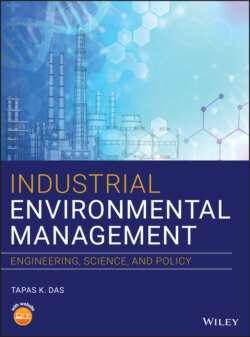Читать книгу Industrial Environmental Management - Tapas K. Das - Страница 39
1.11.3 Investment Recovery
ОглавлениеDuring the transition to Zero Emissions, another early need will be for companies to fill the “decomposer niche,” a term for a specialized form of recycling developed by Raymond Cote at Dalhousie University in Ottawa (1995). Just as decomposer organisms turn dead animals and vegetable matter into forms that can become food for other animals and plants, decomposer niche companies will “consume” otherwise unusable wastes by processing them into usable feedstock or disassembling equipment and marketing reusable components and materials.
The work of decomposers also can be visualized as investment recovery. Taking a systematic approach to ending waste, investment recovery is a traditional service, according to Cote, “an integrated business process that identified, for redeployment, recycling, or remarketing, nonproductive assets generated in the normal course of business.” These assets include idle, obsolete, unused, or inoperable equipment, machinery, or facilities; excess raw materials, operating inventories, and supplies; construction debris; equipment and fixtures in facilities scheduled for demolition; off‐grade, out of specification, or discontinued products; and process waste (Cote 1995, 2003).
The goal of investment recovery is to develop strategies and procedures to recapture the highest value from all surplus assets in a company or community. It seeks to reduce operating and disposal costs, prevent disposal of assets as waste, and find markets for redistributing the by‐products for increased economic value. One of the operating paradigms for an investment recovery firm would be integration of its functions into a comprehensive strategy for an eco‐industrial park. Firms that specialize in this work base their fees on a retainer plus a percent of savings and/or revenues if there is an incentive.
